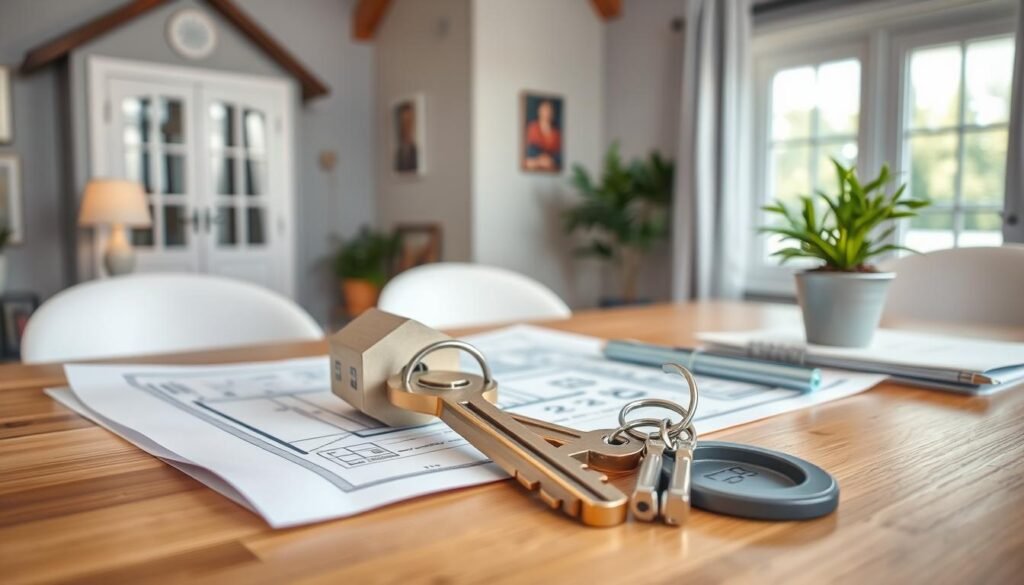This post may contain affiliate links, which means I may earn a commission if you purchase through these links at no extra cost to you
Did you know that the United States is home to over 1.3 million real estate licensed individuals? Yet, for first-time buyers, finding the top real estate agent feels like a challenge. Choosing an agent isn’t a simple pick. It involves finding someone skilled who can navigate through the market and provide all the help you need.
As a Real estate agent, I have to follow strict ethical rules. This is especially true for those of us that are part of the National Association of Realtors, which has more than 1.5 million members. An agent’s job goes beyond just closing a sale. They focus on teaching you, helping you dodge expensive mistakes, and keeping clear communication open.
If you’re buying your first house or hopping to the next, a dedicated agent makes a huge difference. Real estate brokers bring extra training and licenses to the table. They might manage agents or work on their own. That’s why doing your homework, interviewing, and checking licenses of potential agents is crucial, to see if they are a good fit for you.
Knowing what traits make an agent trustworthy enables you to start your real estate venture confidently. You’ll feel sure having a reliable agent with you who matches your specific needs.
Table of Contents
ToggleUnderstanding the Basics of Real Estate Agents
Real estate agents are key in the home buying or selling journey. They help first-timers and experienced clients understand their roles. Knowing how agents work can make your real estate experience better.
What Does a Real Estate Agent Do?
Real estate agents help people buy and sell homes. They give important insights, handle negotiations, and help you decide wisely. The jobs they do can vary a lot:
- A buyer’s agent aids in finding homes, making offers, and negotiating.
- A listing agent helps sellers with pricing, marketing, and showing their homes.

Difference Between a Real Estate Agent and a Broker
Real estate agents and brokers are important but have different roles. Brokers have extra certifications. They can manage agents or own brokerage firms. They provide more services and insights.
Realtor vs. Real Estate Agent
A Realtor is an agent or broker who’s part of the NAR. They follow a strict ethics code and keep learning to offer top-notch service. This makes Realtors stand out in the real estate world.
Realtors also have access to a lot of learning materials from the National Association of Realtors. This keeps them up-to-date with trends and changes.
Why You Need a Real Estate Agent
Getting a real estate agent can make buying a home much better. This is especially true if you’re new to buying houses. Agents give important advice from start to finish, like finding the right house and getting a good deal.
Benefits for First-time Buyers
Buying a home for the first time is exciting but can also be scary. A good agent helps you through the complex parts and can get you better mortgage rates. They also find trusted inspectors to check the house. From a study in 2018, 83% of buyers said having an agent is key to buying a home.
Guidance Through the Home Buying Process
Purchasing a home means knowing the market and making smart offers. A professional agent will guide you, ensuring you stay within budget and reach your goal of owning a home. A survey found that 69% of buyers value the clear information agents provide, making buying a home smoother.
Avoiding Costly Mistakes
Hiring a real estate agent helps avoid big mistakes. They’re great at handling negotiations, which happen in 75% of house sales. An experienced agent will carefully review all documents to prevent issues, making your home purchase safe.
95% of buyers deal with many legal and financial documents when buying a house. This shows how vital professional help is.
Where to Find a Real Estate Agent
Finding the right real estate agent is key to buying a home successfully. It matters whether you’re new to this or have bought homes before. There are many ways to find a good agent. You can get tips from friends, look online, or go to open houses. Let’s dive into three main ways to find a good agent: referrals from those you know, checking online listings and reviews, and visiting open house events.
Referrals from Friends and Family
Getting a real estate agent referral from friends or family is very trusted. People you know well might have used an agent they liked. Their experiences can tell you a lot about an agent’s skills and knowledge. After getting some names, you can look them up online or talk to them yourself.

Online Listings and Reviews
Today, online real estate listings and reviews are super helpful for finding agents. Sites like Realtor.com® and Zillow have lists of agents with client feedback and scores. Real estate agent reviews give you insight into others’ experiences. You can learn what makes an agent good or bad. Make sure to check their licenses through the Better Business Bureau or local real estate offices.
Open House Events
Open house events are great for finding an agent. These let you see agents doing their job. You can talk to them in a relaxed setting. Ask them about the work they do and who they help buy homes. This way, you can meet a few agents and see how they work.
Using online tools, tips from people you know, and going to local real estate events can all help find a good agent. Whether you explore real estate agent referrals, search online real estate listings, or visit open houses, be sure to do your homework. Go with your gut feeling when picking an agent. The right one can really help you through the buying process.
Questions to Ask Prospective Real Estate Agents
Choosing the right real estate agent matters a lot for buying or selling your home. Here are key questions to ask to make sure you pick wisely.
Experience and Specialization
It’s key to know about a potential agent’s experience and focus area. Ask about their work with homes or specific groups like high-end homes or older adults. The best agents in the U.S., the top 5%, can sell homes quicker and for more money than others. Find out how many clients they help each year.
Licensing and Credentials
Checking an agent’s credentials is very important. Make sure they are licensed to meet state rules. This step protects you and builds trust. Always ask to see their license and any special certificates or awards they have earned.
Communication Preferences
Good communication is key for a strong partnership. Since agents have different ways of communicating, it’s smart to talk about what methods work best for you both early on. Most Realtors, about 94% according to NAR, prefer texting. Make sure their communication style matches yours, ensuring you stay informed and confident.

Picking a real estate agent is about finding the right partner for your journey. By asking about their experience, checking their license, and knowing how they communicate, you’re on your way to a successful experience.
Red Flags to Look Out For in a Real Estate Agent
Finding the right real estate agent is key to a smooth deal. Look out for things like agent pitfalls. For instance, 82% of clients say bad communication is a huge problem. Agents not calling or emailing back quickly can mess up your plans. This might slow down your buying or selling process.
Bad online reviews are also something to watch. With 93% of people reading reviews first, it’s smart to check them. Be wary of agents with many negative comments about pushing too hard for sales. Around 75% of clients run the other way from such tactics. These can make you rush and make poor choices.
Be cautious with agents who are too busy to care. About 64% of clients weren’t happy with such agents. They didn’t get the attention or support they needed. Also, transparency is huge; 42% say being in the dark is a total deal-breaker. Make sure your agent is clear about their plans and methods.
Knowing the local market is crucial for an agent. 68% of successful deals involve agents who know the area well. Do your homework and ask for recommendations before choosing an agent. Watching for these signs will help you dodge bad agents. This leads to a better working relationship.



